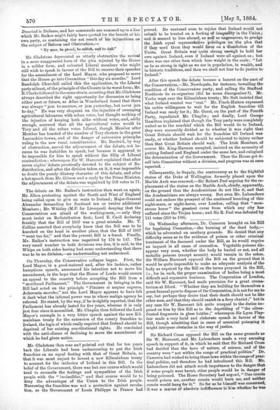On Wednesday afternoon, Dr. Cameron brought on his Bill for
legalising Cremation,—the burning of the dead body,— which he advocated on sanitary grounds. He denied that any difficulty arose as to the evidence of poison or other criminal treatment of the deceased under the Bill, as he would require an inquest in all cases of cremation. Vegetable poisons dis- appear very soon, whether the body be buried or not, and all metallic poisons (except arsenic) would remain in the ashes. Sir William Harcourt opposed the Bill on the ground that it would be quite impossible to make an adequate analysis of the body as required by the Bill on the terms proposed in the Bill,. i.e., for 5s. each, the proper examination of bodies being a most difficult and expensive business. The Corporation of London, said Sir W. Harcourt, had made provision for a great crema- torium at Ilford. "Whether they are building for themselves a great funeral pyre to dispose of the Corporation, it is not for me to- say, but perhaps they desire that their death should not be like other men, and that they should vanish in a fiery chariot ;" but in any case Sir W. Harcourt felt quite unequal to the duties im- posed on him by this Bill as to the depobiting of "the silver- frosted fragments in glass bottles ;" whereupon Sir Lyon Play fair made a very lucid and elaborate speech in favour of the Bill, though admitting that in cases of arsenical poisoning it might interpose obstacles in the way of justice.


































 Previous page
Previous page